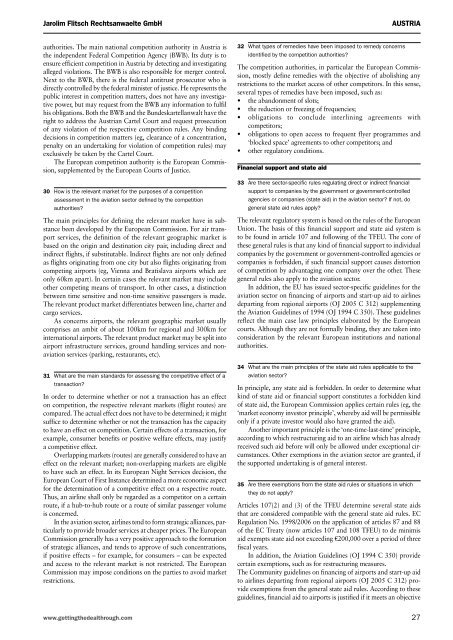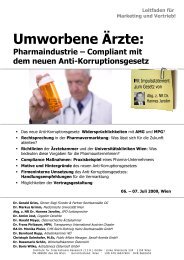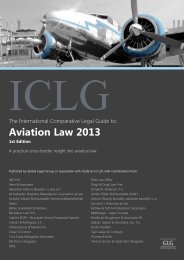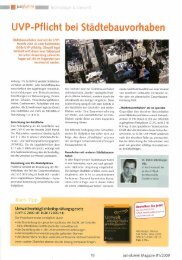Getting the deal through - Air Transport 2011 - Jarolim
Getting the deal through - Air Transport 2011 - Jarolim
Getting the deal through - Air Transport 2011 - Jarolim
You also want an ePaper? Increase the reach of your titles
YUMPU automatically turns print PDFs into web optimized ePapers that Google loves.
<strong>Jarolim</strong> Flitsch Rechtsanwaelte GmbH<br />
AUSTRIA<br />
authorities. The main national competition authority in Austria is<br />
<strong>the</strong> independent Federal Competition Agency (BWB). Its duty is to<br />
ensure efficient competition in Austria by detecting and investigating<br />
alleged violations. The BWB is also responsible for merger control.<br />
Next to <strong>the</strong> BWB, <strong>the</strong>re is <strong>the</strong> federal antitrust prosecutor who is<br />
directly controlled by <strong>the</strong> federal minister of justice. He represents <strong>the</strong><br />
public interest in competition matters, does not have any investigative<br />
power, but may request from <strong>the</strong> BWB any information to fulfil<br />
his obligations. Both <strong>the</strong> BWB and <strong>the</strong> Bundeskartellanwalt have <strong>the</strong><br />
right to address <strong>the</strong> Austrian Cartel Court and request prosecution<br />
of any violation of <strong>the</strong> respective competition rules. Any binding<br />
decisions in competition matters (eg, clearance of a concentration,<br />
penalty on an undertaking for violation of competition rules) may<br />
exclusively be taken by <strong>the</strong> Cartel Court.<br />
The European competition authority is <strong>the</strong> European Commission,<br />
supplemented by <strong>the</strong> European Courts of Justice.<br />
30 How is <strong>the</strong> relevant market for <strong>the</strong> purposes of a competition<br />
assessment in <strong>the</strong> aviation sector defined by <strong>the</strong> competition<br />
authorities?<br />
The main principles for defining <strong>the</strong> relevant market have in substance<br />
been developed by <strong>the</strong> European Commission. For air transport<br />
services, <strong>the</strong> definition of <strong>the</strong> relevant geographic market is<br />
based on <strong>the</strong> origin and destination city pair, including direct and<br />
indirect flights, if substitutable. Indirect flights are not only defined<br />
as flights originating from one city but also flights originating from<br />
competing airports (eg, Vienna and Bratislava airports which are<br />
only 60km apart). In certain cases <strong>the</strong> relevant market may include<br />
o<strong>the</strong>r competing means of transport. In o<strong>the</strong>r cases, a distinction<br />
between time sensitive and non-time sensitive passengers is made.<br />
The relevant product market differentiates between line, charter and<br />
cargo services.<br />
As concerns airports, <strong>the</strong> relevant geographic market usually<br />
comprises an ambit of about 100km for regional and 300km for<br />
international airports. The relevant product market may be split into<br />
airport infrastructure services, ground handling services and nonaviation<br />
services (parking, restaurants, etc).<br />
31 What are <strong>the</strong> main standards for assessing <strong>the</strong> competitive effect of a<br />
transaction?<br />
In order to determine whe<strong>the</strong>r or not a transaction has an effect<br />
on competition, <strong>the</strong> respective relevant markets (flight routes) are<br />
compared. The actual effect does not have to be determined; it might<br />
suffice to determine whe<strong>the</strong>r or not <strong>the</strong> transaction has <strong>the</strong> capacity<br />
to have an effect on competition. Certain effects of a transaction, for<br />
example, consumer benefits or positive welfare effects, may justify<br />
a competitive effect.<br />
Overlapping markets (routes) are generally considered to have an<br />
effect on <strong>the</strong> relevant market; non-overlapping markets are eligible<br />
to have such an effect. In its European Night Services decision, <strong>the</strong><br />
European Court of First Instance determined a more economic aspect<br />
for <strong>the</strong> determination of a competitive effect on a respective route.<br />
Thus, an airline shall only be regarded as a competitor on a certain<br />
route, if a hub-to-hub route or a route of similar passenger volume<br />
is concerned.<br />
In <strong>the</strong> aviation sector, airlines tend to form strategic alliances, particularly<br />
to provide broader services at cheaper prices. The European<br />
Commission generally has a very positive approach to <strong>the</strong> formation<br />
of strategic alliances, and tends to approve of such concentrations,<br />
if positive effects – for example, for consumers – can be expected<br />
and access to <strong>the</strong> relevant market is not restricted. The European<br />
Commission may impose conditions on <strong>the</strong> parties to avoid market<br />
restrictions.<br />
32 What types of remedies have been imposed to remedy concerns<br />
identified by <strong>the</strong> competition authorities?<br />
The competition authorities, in particular <strong>the</strong> European Commission,<br />
mostly define remedies with <strong>the</strong> objective of abolishing any<br />
restrictions to <strong>the</strong> market access of o<strong>the</strong>r competitors. In this sense,<br />
several types of remedies have been imposed, such as:<br />
• <strong>the</strong> abandonment of slots;<br />
• <strong>the</strong> reduction or freezing of frequencies;<br />
• obligations to conclude interlining agreements with<br />
competitors;<br />
• obligations to open access to frequent flyer programmes and<br />
‘blocked space’ agreements to o<strong>the</strong>r competitors; and<br />
• o<strong>the</strong>r regulatory conditions.<br />
Financial support and state aid<br />
33 Are <strong>the</strong>re sector-specific rules regulating direct or indirect financial<br />
support to companies by <strong>the</strong> government or government-controlled<br />
agencies or companies (state aid) in <strong>the</strong> aviation sector? If not, do<br />
general state aid rules apply?<br />
The relevant regulatory system is based on <strong>the</strong> rules of <strong>the</strong> European<br />
Union. The basis of this financial support and state aid system is<br />
to be found in article 107 and following of <strong>the</strong> TFEU. The core of<br />
<strong>the</strong>se general rules is that any kind of financial support to individual<br />
companies by <strong>the</strong> government or government-controlled agencies or<br />
companies is forbidden, if such financial support causes distortion<br />
of competition by advantaging one company over <strong>the</strong> o<strong>the</strong>r. These<br />
general rules also apply to <strong>the</strong> aviation sector.<br />
In addition, <strong>the</strong> EU has issued sector-specific guidelines for <strong>the</strong><br />
aviation sector on financing of airports and start-up aid to airlines<br />
departing from regional airports (OJ 2005 C 312) supplementing<br />
<strong>the</strong> Aviation Guidelines of 1994 (OJ 1994 C 350). These guidelines<br />
reflect <strong>the</strong> main case law principles elaborated by <strong>the</strong> European<br />
courts. Although <strong>the</strong>y are not formally binding, <strong>the</strong>y are taken into<br />
consideration by <strong>the</strong> relevant European institutions and national<br />
authorities.<br />
34 What are <strong>the</strong> main principles of <strong>the</strong> state aid rules applicable to <strong>the</strong><br />
aviation sector?<br />
In principle, any state aid is forbidden. In order to determine what<br />
kind of state aid or financial support constitutes a forbidden kind<br />
of state aid, <strong>the</strong> European Commission applies certain rules (eg, <strong>the</strong><br />
‘market economy investor principle’, whereby aid will be permissible<br />
only if a private investor would also have granted <strong>the</strong> aid).<br />
Ano<strong>the</strong>r important principle is <strong>the</strong> ‘one-time-last-time’ principle,<br />
according to which restructuring aid to an airline which has already<br />
received such aid before will only be allowed under exceptional circumstances.<br />
O<strong>the</strong>r exemptions in <strong>the</strong> aviation sector are granted, if<br />
<strong>the</strong> supported undertaking is of general interest.<br />
35 Are <strong>the</strong>re exemptions from <strong>the</strong> state aid rules or situations in which<br />
<strong>the</strong>y do not apply?<br />
Articles 107(2) and (3) of <strong>the</strong> TFEU determine several state aids<br />
that are considered compatible with <strong>the</strong> general state aid rules. EC<br />
Regulation No. 1998/2006 on <strong>the</strong> application of articles 87 and 88<br />
of <strong>the</strong> EC Treaty (now articles 107 and 108 TFEU) to de minimis<br />
aid exempts state aid not exceeding e200,000 over a period of three<br />
fiscal years.<br />
In addition, <strong>the</strong> Aviation Guidelines (OJ 1994 C 350) provide<br />
certain exemptions, such as for restructuring measures.<br />
The Community guidelines on financing of airports and start-up aid<br />
to airlines departing from regional airports (OJ 2005 C 312) provide<br />
exemptions from <strong>the</strong> general state aid rules. According to <strong>the</strong>se<br />
guidelines, financial aid to airports is justified if it meets an objective<br />
www.getting<strong>the</strong><strong>deal</strong><strong>through</strong>.com 27





